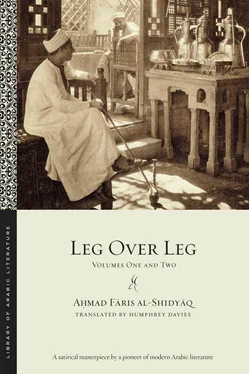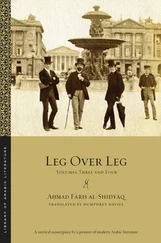2.11.8
Said the Fāriyāq, “I told him, ‘By God, now you have two great claims on my gratitude! The first is your concern for my welfare, the second your galvanizing me to write verse, for I had resolved to do so only far from people’s eyes. Behold now, My Master, my gratitude and hear me broadcast, like a lion roaring, your generous attitude !’” Then he left his house, calling down blessings on the other’s name, having decided that he would part company with the Bag-man the following day.
(1) al-izwā’ is “a man’s coming accompanied by another.”
CHAPTER 12: POEMS FOR PRINCES
2.12.1
Our friend the Fāriyāq had no heavy baggage at the Bag-man’s house other than his own body, so he took his tambour under his arm, put his pen-box in his belt, and told the man, “God has come to my aid and shown me a path different from that laid down for me by you and your company of Bag-men. Today I shall leave you and nothing shall dissuade me.” “How can you leave me, when I’ve done you no injury?” asked the other. “This tambour,” replied the Fāriyāq, “bears witness against you that you did.” “If the tambour-player isn’t acceptable as a witness, how can the witness of the instrument itself — the reason for the discounting of its owner’s witness — be valid?” 508“On the contrary,” said the Fāriyāq “it’s as valid as your father’s mare’s, can announce your sins as loudly as your grandfather’s she-ass, and can demolish the castles where you store your peddlers’ goods as well as any kingly trumpet!” 509Said he, “What am I to make of such a peroration ?” “That it’s revelation and inspiration !” he replied. “It doesn’t matter if you play your tambour,” the Bag-man said, “for I’ve discovered that the servant only brought the complaint against you out of envy.” “Never!” said the Fāriyāq. “I’m going to play it to people who tell me, ‘More!’ and ‘Encore!’ and ‘Well done!’ and ‘ Allāh !’ 510not to foreigners who only say God’s name when praying.” “You’re a trouble-maker and have gone too far !” said the man. “And you’ve let me down and haven’t treated me fair !” the Fāriyāq retorted. “You’re untrue !” he said. “And you’re a Jew !” he responded. Then he turned his back on him, head held high, eyes bulging with fury, and set off, and he rented a room, where he stowed his tambour and made his way to the Panegyricon.
2.12.2
He had barely had time to take his seat before a messenger appeared before him with a piece of paper in his hand, on which were two lines of verse that were to be translated, for after they had been presented to those translating into languages other than Arabic and delivered by them to the Grand Panjandrum of the Panegyricon, it was finally the Fāriyāq’s turn. He took up his pen and wrote,
The prince this day rode the best of his steeds
But would that he’d taken his seat on our backs!
Among us there’s none that bucks or kicks ( rāmiḥ aw rāfis )—
Nay, through him, all of us are turned into hacks.
When the Grand Panjandrum compared these verses to the original, he found that they encapsulated the meaning as the belly does the fetus or the intestines the duodenum, without at the same time stuffing it with the words that poets usually use to fill in the weak spots in their poems. Delighted, he said, “These verses are preferable to the translations made by the foreigners, in which I find only repetition. But maybe such is their way, so let us leave them to their own devices.”
2.12.3
However, when the verses became known to the critics, some objected that rāmih and rāfis were synonymous, so either the first or the second had to be considered an error, and it would have been better if he’d written jāmiḥ (“bolts”) aw rāmiḥ , which, in addition, form a doublet. To this response was made that the word rāmiḥ has many meanings, among them “a bull with two horns,” and it may be used as the verbal adjective of ramaḥa meaning “to thrust with the lance ( rumḥ )” or in the sense “he became armed with a lance”; there’s also ramaḥa l-barq meaning “the lightning flashed.” To this the riposte would be that there’s no way for a bull to get in there with his horns because people don’t ride bulls, even if al-Mutanabbī raises such a possibility in the ode of his known as Al-Ghabab ( The Wattle ), 511and that the verbal adjective from “to thrust” is inappropriate since a “mount” cannot “thrust.”
2.12.4
The following day a second messenger appeared bringing a piece of paper on which were two more verses, and the Fāriyāq wrote,
The prince arose betimes — all earth shaking
At that early rising — to partake of his matitudinal potation.
Or could it be that the sun reached out to him with its rays,
Through his window, on beholding his elation?
Objection was made that the second verse is poorly tacked on to the first, to which the response is that it follows naturally from it and is linked to it because when the earth shook, it scared mankind with its brutal power, and then along came the sun and reassured it with its rays. The riposte to this was that the sun’s reassurance would have been feeble compared to the shaking of the earth and so would have done no good, to which the response is that such reassurance is an inescapable fact, as the sun cannot rise before sunrise. Certain persons made fun of this explanation.
2.12.5
The third day, another messenger appeared, and the Fāriyāq wrote,
The prince slept soundly last night
With nary a care in his noble head.
When he sleeps, the nation of men-and-jinn sleeps too.
When he rises, it rises, and then it’s a crime to be a-bed.
Objection was made to the word “men-and-jinn” ( al-thaqalayn ) on the grounds that it was “heavy” ( thaqīlah ), and that “nation” ought to have been put in the dual. 512The response is that the word is light and its derivation from thiqal (“heaviness”) has no bearing. 513
2.12.6
The fourth day, another messenger appeared, and he wrote,
The prince drank, thus rend’ring the consumption of wine permitted—
He dispensed with the lawyer’s rule that says it’s not admitted.
Should any who say it’s a sin insist,
The aid of your sharpest sword enlist!
Objection was made to the ugly exaggeration amounting to blasphemy and disregard for the Revelation, to which the response is that it just follows the original.
2.12.7
The fifth day, another messenger appeared, and he wrote,
The prince repaired with his squadron on foot ( māshiyan )
To the bathhouse in the pre-dawn dark, there to luxuriate.
The pair of hands that has scrubbed their two bodies but once
Are thenceforth something one cannot but osculate.
Objection was made on the grounds that it would have been more proper to say “on their two sets of feet” ( māshiyayn ), to which the riposte would be that there’s nothing wrong with “on foot” because appeal to the rule of taghlīb as applied to māshiyayn implicitly admits that the prince may stand for both. 514Further objection was made that it would have been chaster to say “the body (singular) of each of the two” or “the bodies (plural) of each of the two,” 515to which the response would be that chaster does not invalidate chaste. Then it was claimed that he had committed the fault of bending the rules of grammar under pressure from the exigencies of verse by omitting the preposition in the last hemistich, since correct diction would require bi-an in place of an , not to mention that the use of the dual here in reference to “hands” is meaningless, for the scrubber doesn’t use both hands. To this the response would be that one is allowed to omit the preposition with an , while the dual is there to announce that the scrubber’s every limb was created to serve the object of the panegyric.
Читать дальше












